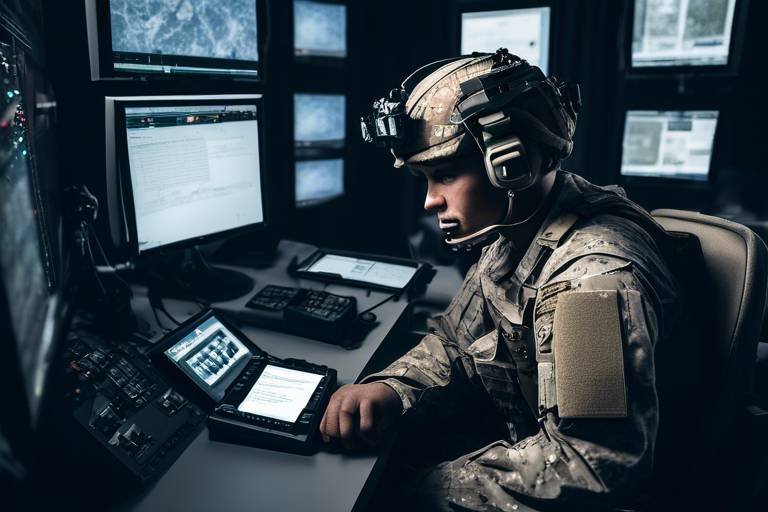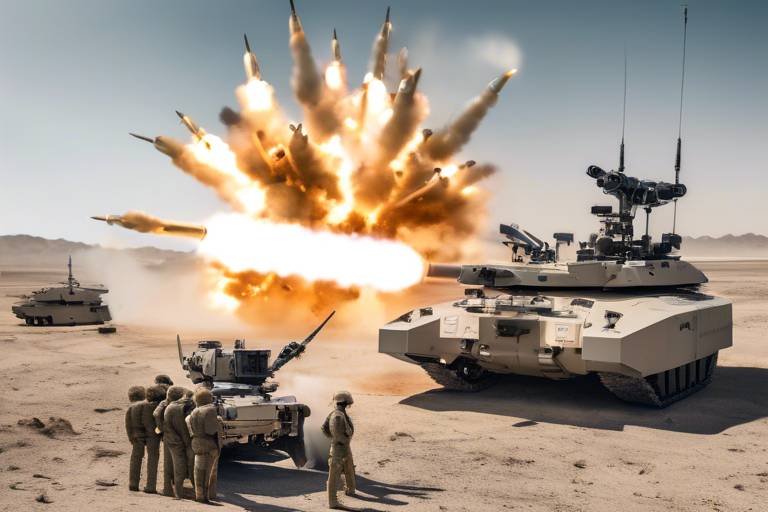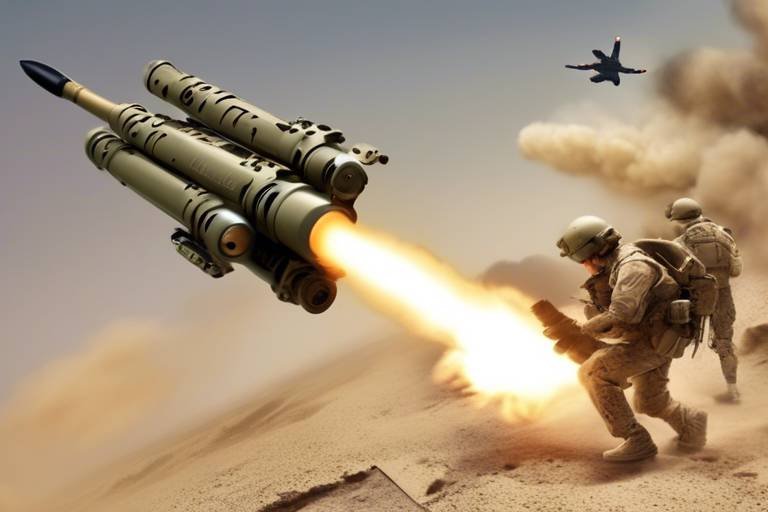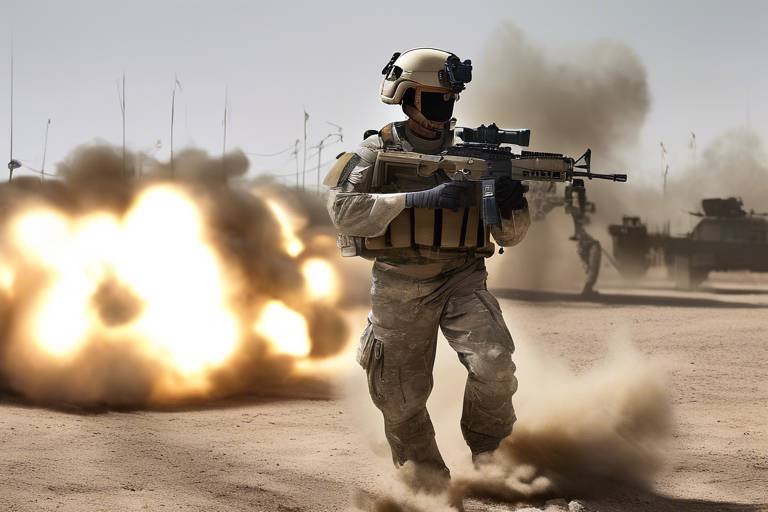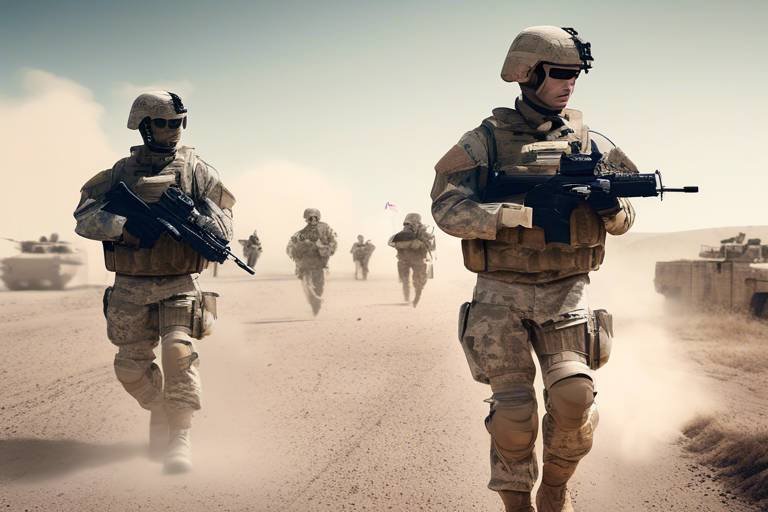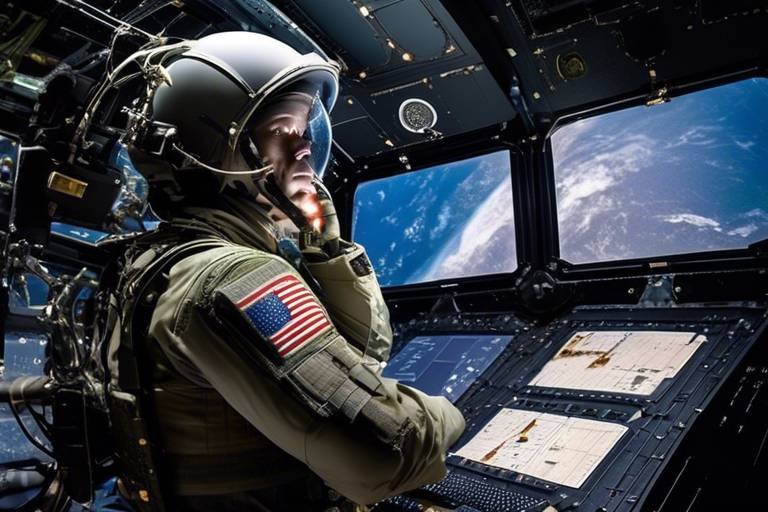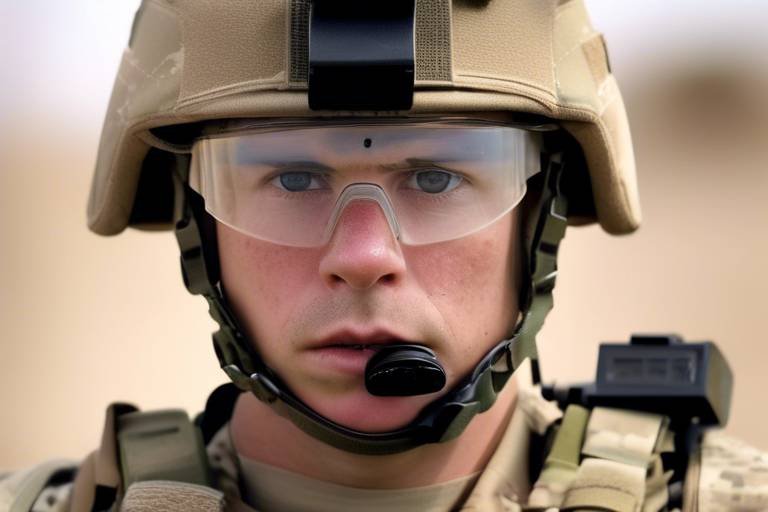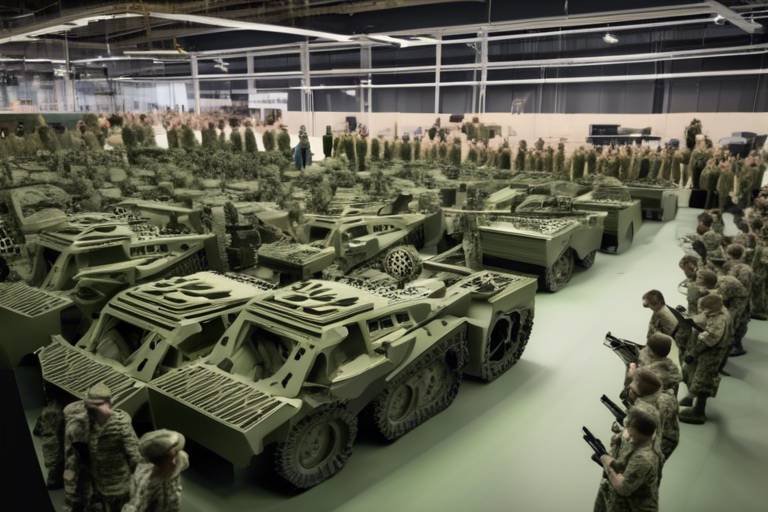Top Developments in Quantum Technologies for Military Use
In today's rapidly evolving technological landscape, the intersection of quantum technologies and military applications is nothing short of revolutionary. As nations race to harness the power of quantum mechanics, the potential for enhancing national security through advanced communication, computing, and sensing capabilities is immense. Imagine a world where military communications are virtually unhackable, where complex logistical challenges are solved in seconds, and where surveillance systems can detect threats with unparalleled precision. This article dives deep into the latest advancements in quantum technologies, exploring how they are set to transform military operations and redefine the future of defense.
At the forefront of quantum technology is quantum communication, which offers a level of security that traditional systems simply cannot match. Through techniques such as quantum key distribution (QKD), military communications can achieve a level of encryption that makes them virtually impervious to hacking. Recent breakthroughs in this field have introduced new protocols and systems that promise to enhance the security of defense operations significantly. For instance, imagine a battlefield where every communication is shielded from prying eyes, ensuring that sensitive information remains confidential. This section delves into the innovations that are paving the way for secure military communications, making them a game-changer in the realm of defense.
Quantum computing is another area where advancements are creating waves in military applications. The ability to process information at speeds that are currently unimaginable opens up a world of possibilities for solving complex military problems. From cryptography to logistics and battlefield simulations, quantum algorithms are being developed to tackle challenges that have long plagued military strategists. These algorithms are not just theoretical; they are being tested and implemented, showing promise in enhancing decision-making processes and operational efficiency. Let's explore some of the key advancements in quantum algorithms and their implications for military operations.
Recent advancements in quantum algorithms are paving the way for faster data processing and problem-solving capabilities. For example, algorithms that can optimize resource allocation and logistics are crucial for military operations. Imagine a scenario where commanders can receive real-time data analysis and recommendations, allowing them to make informed decisions swiftly. These advancements are not just theoretical; they represent a significant leap towards operational excellence in defense.
One of the most critical applications of quantum computing in the military is its ability to tackle optimization problems. Military logistics often involve complex variables and constraints that can be challenging to manage using classical computing methods. Quantum algorithms can analyze vast datasets to determine the most efficient resource allocation, route planning, and mission scheduling. This capability can lead to streamlined operations, ensuring that resources are used effectively and missions are executed with precision.
As we delve deeper into the realm of quantum computing, it's essential to address the dual-edged sword of cryptography enhancements. While quantum computers have the potential to break traditional cryptographic codes, they also offer the promise of developing new cryptographic methods that are inherently secure. Quantum cryptography can create communication systems that are resistant to future threats, ensuring that military communications remain secure in an ever-evolving digital landscape. This section explores how these advancements can safeguard sensitive information against potential adversaries.
To fully harness the power of quantum computing, integrating these technologies with existing military systems is crucial. The transition to quantum-enhanced systems requires careful planning and execution. Strategies for seamless incorporation into current defense infrastructures are essential for maximizing the benefits of quantum technologies. This integration will not only enhance operational capabilities but also ensure that military forces remain at the forefront of technological advancements.
Another exciting development in quantum technologies is the emergence of quantum sensors. These sensors are revolutionizing surveillance capabilities by providing highly sensitive detection methods that can identify threats with incredible accuracy. From detecting minute changes in magnetic fields to identifying gravitational waves, quantum sensors are set to enhance military intelligence and reconnaissance operations significantly. Let’s examine some of the latest innovations in quantum sensing technologies and their implications for military applications.
Advanced quantum sensors capable of detecting gravitational waves offer unique insights into potential threats. This technology can be utilized for early warning systems, allowing military forces to anticipate and respond to emerging dangers. Imagine a system that can detect the slightest disturbances in gravitational waves, providing critical intelligence before a threat materializes. This capability could be a game-changer in national security.
Quantum sensors also excel in measuring minute changes in magnetic fields, which has profound implications for naval and aerial surveillance operations. These sensors can detect submarines and other stealth technologies that conventional systems might miss. The ability to identify hidden threats enhances situational awareness and ensures that military forces are always one step ahead of adversaries. This segment discusses how these advancements can be integrated into existing surveillance frameworks, significantly enhancing military intelligence capabilities.
- What is quantum communication?
Quantum communication utilizes principles of quantum mechanics to transmit information securely, making it nearly impossible to intercept without detection. - How does quantum computing benefit the military?
Quantum computing can solve complex problems at unprecedented speeds, improving logistics, cryptography, and operational efficiency. - What are quantum sensors?
Quantum sensors are advanced devices that leverage quantum mechanics to detect changes in physical phenomena with high sensitivity, enhancing surveillance capabilities.

Quantum Communication Systems
Quantum communication is not just a buzzword; it's a groundbreaking leap into the future of secure military communications. Imagine a world where your most sensitive information is transmitted with a level of security that is virtually unhackable. This is the promise of quantum key distribution (QKD), a technique that uses the principles of quantum mechanics to create a communication channel that is inherently secure. With QKD, any attempt to eavesdrop on the communication will disturb the quantum state, alerting the parties involved to the presence of an intruder. This revolutionary approach is set to transform how military operations communicate, ensuring that vital information remains confidential.
Recent breakthroughs in quantum communication systems have shown immense potential for enhancing national security. For instance, researchers have developed quantum repeaters that extend the range of quantum communications over long distances. Traditional communication systems suffer from signal degradation over distance, but quantum repeaters can maintain the integrity of the quantum state, allowing for secure communication across vast geographical areas. This capability is crucial for military operations that require real-time communication across different locations without compromising security.
Furthermore, advancements in quantum entanglement have opened new avenues for military communications. By entangling particles, military forces can achieve instantaneous communication between two points, regardless of the distance separating them. This phenomenon, often described as "spooky action at a distance," could change the dynamics of military strategy, enabling commanders to make swift decisions based on real-time data without the risk of interception.
To better understand the impact of these advancements, let's consider some key features of quantum communication systems:
| Feature | Description |
|---|---|
| Unhackable Security | Utilizes quantum mechanics to detect eavesdropping. |
| Long-Distance Communication | Quantum repeaters extend communication range without loss of integrity. |
| Instantaneous Data Transfer | Quantum entanglement enables real-time communication. |
As military forces around the globe invest in quantum communication technologies, the implications for national security are profound. The ability to transmit information securely and instantly can enhance operational efficiency, reduce the risk of intelligence leaks, and ultimately save lives. However, this technology does not come without challenges. The need for robust infrastructure to support quantum networks is paramount, and ongoing research is essential to overcome technical hurdles.
In summary, quantum communication systems represent a paradigm shift in how military forces can secure their communications. With innovations like quantum key distribution, quantum repeaters, and entanglement, the military landscape is on the cusp of a transformative change. As we move forward, the integration of these technologies will be crucial in maintaining an edge in national security.
- What is quantum key distribution (QKD)? QKD is a method of secure communication that uses the principles of quantum mechanics to create a communication channel that is theoretically unhackable.
- How does quantum entanglement work? Quantum entanglement is a phenomenon where two particles become interconnected in such a way that the state of one instantly influences the state of the other, regardless of the distance between them.
- What are quantum repeaters? Quantum repeaters are devices that extend the distance over which quantum information can be transmitted without losing its integrity, crucial for long-distance secure communications.

Quantum Computing for Defense
Quantum computing is not just a buzzword; it's a game-changer that holds the potential to transform how military operations are conducted. Imagine being able to solve complex logistical challenges in the blink of an eye or decrypting enemy communications before they even realize they're compromised. This is the promise of quantum computing, and it's becoming a reality faster than many anticipated. With advancements in quantum algorithms and hardware, the military is poised to leverage this technology to enhance its operational capabilities significantly.
One of the most exciting aspects of quantum computing is its ability to process vast amounts of data at unprecedented speeds. Traditional computers struggle with certain complex problems, often taking years to find solutions. In contrast, quantum computers use qubits, which can exist in multiple states simultaneously, allowing them to perform calculations that would take classical computers an eternity. This capability is particularly crucial in defense scenarios where time is of the essence.
To illustrate the potential impact of quantum computing in defense, let's consider a few key areas:
- Cryptography: Quantum computers can break traditional encryption methods, but they also pave the way for new, more secure cryptographic techniques, such as quantum key distribution (QKD). This ensures that military communications remain secure against even the most sophisticated cyber threats.
- Logistics: The military often grapples with complex logistical challenges, from troop movements to supply chain management. Quantum algorithms can optimize these processes, ensuring that resources are allocated efficiently and effectively.
- Battlefield Simulations: Quantum computing can enhance simulations used for training and strategic planning. By processing vast datasets quickly, military strategists can run multiple scenarios in real-time, helping them make informed decisions on the battlefield.
As we delve deeper into the specifics of quantum computing's impact on defense, it's essential to highlight recent advancements in quantum algorithms. These algorithms are designed to tackle specific military problems, enhancing decision-making and operational efficiency. For instance, algorithms like the Quantum Approximate Optimization Algorithm (QAOA) are being explored for their potential to solve optimization problems that are critical for military logistics and resource allocation.
Recent breakthroughs in quantum algorithms are paving the way for faster data processing. For example, the development of quantum machine learning algorithms can improve threat detection and analysis, allowing military personnel to stay one step ahead of potential adversaries. By utilizing quantum algorithms, the military can analyze patterns and predict outcomes with a degree of accuracy that was previously unattainable.
Optimization problems are at the heart of many military operations, from troop deployments to equipment maintenance schedules. Quantum computing can tackle these challenges by finding optimal solutions much faster than classical computers. This capability not only streamlines operations but also enhances mission planning, ensuring that resources are used effectively and efficiently.
As mentioned earlier, the rise of quantum computing poses risks to traditional cryptographic methods. However, it also offers new avenues for securing military communications. Quantum cryptography, particularly QKD, allows for the creation of secure communication channels that are theoretically immune to eavesdropping. This is crucial for maintaining national security in an increasingly digital world.
Integrating quantum computing with existing military technologies is essential for maximizing its benefits. This means developing strategies for seamless incorporation into current defense systems and infrastructure. The military must invest in training personnel to work with quantum technologies and ensure that they can collaborate effectively with traditional systems. By doing so, they can create a hybrid environment where both classical and quantum computing coexist, leveraging the strengths of each to enhance overall capabilities.
Q: What is quantum computing?
A: Quantum computing is a type of computation that utilizes quantum bits (qubits) to process information in ways that classical computers cannot, allowing for faster problem-solving and data analysis.
Q: How does quantum computing benefit the military?
A: Quantum computing enhances military operations by improving cryptography, optimizing logistics, and enabling advanced simulations, ultimately leading to more efficient and effective decision-making.
Q: What are the risks associated with quantum computing?
A: While quantum computing poses risks to traditional encryption methods, it also offers new cryptographic solutions that can secure communications against potential threats.
Q: Is quantum computing ready for military use?
A: While still in the developmental stage, significant advancements are being made, and the military is actively exploring ways to integrate quantum technologies into its operations.

Algorithm Advancements
In the ever-evolving landscape of military technology, in quantum computing are emerging as game-changers. These breakthroughs are not just technical feats; they represent a fundamental shift in how we approach problem-solving in defense scenarios. Imagine having the capability to analyze vast amounts of data in a fraction of the time it takes conventional systems. This is precisely what quantum algorithms promise, and their implications for military operations are profound.
At the heart of this transformation are quantum algorithms that leverage the principles of superposition and entanglement. These principles allow quantum computers to process information in ways that traditional computers simply cannot. For instance, while classical algorithms might struggle with complex optimization problems, quantum algorithms can navigate these challenges with remarkable speed and efficiency. This capability is particularly crucial in military contexts where time-sensitive decisions can mean the difference between success and failure.
Some of the most notable advancements include:
- Shor's Algorithm: This revolutionary algorithm can factor large numbers exponentially faster than the best-known classical algorithms, posing a significant threat to traditional cryptography. However, it also opens doors to new cryptographic methods that can enhance military communications.
- Grover's Algorithm: This algorithm improves search capabilities within databases, making it easier to sift through intelligence data to find critical information quickly.
- Quantum Approximate Optimization Algorithm (QAOA): This algorithm is designed for solving combinatorial optimization problems, which are prevalent in military logistics and resource allocation.
These algorithms are not just theoretical; they are being actively developed and tested. For example, recent simulations have demonstrated that quantum algorithms can reduce the time required for logistical planning from days to mere hours. This speed is vital when military units need to adapt to rapidly changing battlefield conditions.
Moreover, the integration of these algorithms into existing systems is a priority for defense organizations. The synergy between quantum computing and traditional military technologies can lead to enhanced decision-making processes, where commanders have access to real-time data analysis and predictive modeling. This integration ensures that military personnel can make informed choices based on accurate and timely information.
However, it's essential to acknowledge the challenges that come with these advancements. The transition to quantum computing requires not only new hardware but also a shift in mindset and training for personnel. As we stand on the brink of this technological revolution, the military must invest in research and development to fully harness the potential of quantum algorithms.
In summary, the advancements in quantum algorithms are set to redefine military operations. By enabling faster data processing and enhancing decision-making, these algorithms offer a glimpse into a future where military effectiveness is significantly amplified. The journey is just beginning, but the potential is enormous, and the stakes are high.
- What are quantum algorithms? Quantum algorithms are computational procedures designed to run on quantum computers, leveraging quantum mechanics principles to solve problems more efficiently than classical algorithms.
- How do quantum algorithms improve military operations? They enable faster data processing, enhance decision-making capabilities, and provide solutions to complex optimization problems critical for logistics and resource allocation.
- Are there risks associated with quantum algorithms? Yes, while they offer significant advantages, they also pose risks to traditional cryptography, necessitating the development of new security protocols.

Optimization Problems
When it comes to military logistics, the term optimization is more than just a buzzword; it's a critical factor that can determine the success of missions. Imagine trying to coordinate the movements of thousands of troops, vehicles, and supplies across various terrains and conditions. The complexity of this task can be overwhelming, but quantum computing is stepping in to save the day. With its ability to process vast amounts of data at lightning speed, quantum computing can tackle optimization problems that traditional computers struggle with.
One of the most significant advantages of quantum computing is its capability to analyze multiple scenarios simultaneously. This means that military strategists can evaluate numerous logistics options in real-time, leading to more informed decision-making. For example, when planning a supply chain for a military operation, quantum algorithms can quickly determine the most efficient routes, taking into account factors like fuel consumption, time constraints, and potential threats. This kind of rapid analysis can significantly reduce costs and improve operational efficiency.
Moreover, quantum algorithms can address complex optimization problems such as:
- Resource Allocation: Ensuring that troops have the right resources at the right time can be a logistical nightmare. Quantum computing can optimize the distribution of supplies, equipment, and personnel.
- Route Optimization: Identifying the safest and quickest routes for troop movements can be achieved through advanced quantum algorithms, minimizing exposure to enemy forces.
- Mission Planning: Quantum computing can facilitate better mission planning by simulating various scenarios and outcomes, allowing commanders to make educated choices.
To illustrate the potential impact, consider a hypothetical scenario where a military unit needs to deploy resources across a vast area. Traditional computing methods might take hours or even days to analyze the best course of action. In contrast, quantum computing can deliver solutions in mere minutes, allowing commanders to adapt quickly to changing situations on the ground.
In summary, the integration of quantum computing into military logistics not only enhances efficiency but also provides a strategic advantage. By solving optimization problems faster and more accurately than ever before, quantum technologies are paving the way for a new era of military operations that are smarter, quicker, and ultimately more effective.
- What are optimization problems in military logistics?
Optimization problems involve finding the most efficient way to allocate resources, plan routes, and schedule operations to achieve military objectives. - How does quantum computing improve optimization?
Quantum computing can process vast amounts of data simultaneously, allowing for quicker and more accurate solutions to complex optimization problems. - What are some examples of optimization in military operations?
Examples include resource allocation, route optimization for troop movements, and mission planning simulations.

Cryptography Enhancements
In the ever-evolving landscape of military technology, through quantum computing are not just a luxury; they are a necessity. Traditional cryptographic methods, which have served us well for decades, are now facing unprecedented challenges due to the rise of quantum computers. These powerful machines have the potential to crack conventional encryption codes in a matter of minutes, rendering sensitive military communications vulnerable to interception. However, with challenge comes opportunity, and the field of quantum cryptography is stepping up to the plate with groundbreaking solutions.
At the heart of quantum cryptography is the concept of quantum key distribution (QKD). This innovative technique utilizes the principles of quantum mechanics to create a secure communication channel that is virtually unhackable. Imagine trying to eavesdrop on a conversation where any attempt to intercept the signal changes the very nature of the information being transmitted. That's the magic of QKD—if someone tries to snoop, the intended recipients will know immediately, allowing them to take necessary precautions. This level of security is a game-changer for military operations, where the integrity of information is paramount.
Recent advancements in quantum cryptography have led to the development of protocols that not only enhance security but also improve efficiency. For instance, the BB84 protocol, one of the first and most widely studied QKD methods, has been refined to allow for faster key generation and transmission. This means that military units can communicate securely without the lag that often accompanies traditional encryption methods, ensuring that critical information is relayed in real time.
Moreover, the integration of quantum cryptography with existing military communication systems is being actively explored. This integration aims to create a seamless transition to quantum-secure communications without overhauling the entire infrastructure. For example, military bases could utilize hybrid systems that combine classic encryption with quantum-enhanced methods, ensuring that even if one layer is compromised, the other remains secure. This layered approach to security not only protects sensitive data but also enhances the overall resilience of military communications.
As we look to the future, the potential applications of quantum cryptography in military contexts are vast. From protecting classified communications to securing battlefield information, the implications are profound. However, it’s crucial for military strategists and technologists to stay ahead of the curve by continually evolving their cryptographic measures in line with advancements in quantum computing. The goal is clear: to create a communication framework that is robust, efficient, and above all, secure.
- What is quantum key distribution (QKD)? QKD is a method of secure communication that uses quantum mechanics to create a communication channel that is theoretically immune to eavesdropping.
- How does quantum cryptography enhance military communication? It provides a level of security that traditional methods cannot match, allowing military units to communicate sensitive information without the risk of interception.
- Can quantum cryptography be integrated with existing systems? Yes, hybrid systems can be developed to combine traditional encryption methods with quantum-enhanced techniques for improved security.
- What are the risks of traditional cryptography in the age of quantum computing? Traditional encryption methods may become vulnerable to attacks from quantum computers, which can process information at speeds far beyond current capabilities.

Integration with Existing Technologies
Integrating quantum computing with existing military technologies is not just a matter of adding a new tool to the toolbox; it's about transforming the entire operational landscape. As military forces around the globe seek to enhance their capabilities, the seamless incorporation of quantum systems into current infrastructures is essential. This integration can lead to a substantial increase in efficiency, speed, and accuracy in decision-making processes.
One of the primary challenges in this integration is ensuring compatibility with legacy systems. Many military operations rely on tried-and-true technologies that have been developed over decades. Therefore, developers must create hybrid systems that can leverage the strengths of both quantum and classical computing. For example, quantum algorithms can be run in parallel with existing software to enhance data processing without completely overhauling the current systems.
Moreover, training personnel to understand and utilize quantum technologies is crucial. The military's effectiveness hinges on the skill set of its operators, and as quantum systems become more prevalent, training programs must evolve. This involves not only teaching the technical aspects of quantum computing but also instilling a mindset that embraces innovation and adaptability.
Additionally, a well-structured implementation roadmap is necessary for a smooth transition. This roadmap should outline the phases of integration, from initial pilot projects to full-scale deployment. It’s important to start small, testing quantum applications in controlled environments before rolling them out to more critical operations. Such an approach minimizes risk while demonstrating the tangible benefits of quantum technologies.
| Integration Phase | Activities | Expected Outcomes |
|---|---|---|
| Pilot Testing | Run simulations and small-scale tests | Identify strengths and weaknesses of quantum integration |
| Training | Develop training programs for military personnel | Ensure users are proficient in quantum technologies |
| Full Deployment | Integrate quantum systems into routine operations | Enhance operational efficiency and decision-making |
Furthermore, collaboration with technology partners and research institutions can drive innovation. By fostering partnerships, military organizations can stay at the forefront of quantum advancements, ensuring that they are not only keeping pace but also leading in the development of cutting-edge solutions. This collaborative approach can also facilitate the sharing of best practices and lessons learned, which is invaluable in a rapidly evolving field.
As we look toward the future, the integration of quantum computing into military operations is not merely a possibility; it is an impending reality. The potential benefits are immense, ranging from improved logistics and resource allocation to enhanced battlefield simulations. By embracing this technology and effectively integrating it with existing systems, military forces can gain a decisive edge in national security.
- What are the main challenges in integrating quantum technology with existing military systems?
The main challenges include ensuring compatibility with legacy systems, training personnel, and developing a clear implementation roadmap.
- How can military personnel be trained to use quantum technologies?
Training programs should be developed to cover both the technical aspects of quantum computing and the mindset needed for innovation and adaptability.
- What are the expected outcomes of successful integration?
Successful integration can lead to enhanced operational efficiency, improved decision-making, and a significant strategic advantage in military operations.

Quantum Sensors for Enhanced Surveillance
In the ever-evolving landscape of military technology, quantum sensors are emerging as game-changers, offering capabilities that traditional sensors simply cannot match. These advanced tools utilize the principles of quantum mechanics to achieve unprecedented levels of sensitivity and accuracy. Imagine having the ability to detect even the slightest changes in the environment, which can be crucial for identifying potential threats. This section delves into the latest innovations in quantum sensing technologies that are set to significantly enhance military intelligence and reconnaissance.
One of the most exciting developments in quantum sensing is the ability to detect gravitational waves. These ripples in spacetime, caused by massive cosmic events, can provide unique insights into potential threats. Advanced quantum sensors are now capable of picking up these minute disturbances, offering military strategists an early warning system that could mean the difference between success and failure in critical operations. By harnessing this technology, military forces can gain a tactical advantage, allowing them to respond proactively rather than reactively.
Additionally, quantum sensors excel in magnetic field sensing. They can measure incredibly small variations in magnetic fields, which is particularly useful for detecting submarines and other stealth technologies that rely on reduced electromagnetic signatures. This capability is essential for naval and aerial surveillance operations, where traditional methods may struggle to identify hidden threats. With quantum sensors, military personnel can monitor vast areas with enhanced precision, ensuring that no potential danger goes unnoticed.
The implications of these advancements are profound. For instance, consider a scenario where a naval fleet is deployed to monitor a sensitive region. Utilizing quantum sensors, the fleet can gather real-time data on enemy movements and environmental conditions, enabling them to make informed decisions swiftly. This not only enhances situational awareness but also improves overall mission effectiveness. As these technologies continue to develop, we can expect to see a shift in how military operations are conducted, with quantum sensors playing a pivotal role in shaping future strategies.
To illustrate the potential of quantum sensors, let's look at a comparison of traditional sensors versus quantum sensors:
| Feature | Traditional Sensors | Quantum Sensors |
|---|---|---|
| Sensitivity | Moderate | High |
| Detection Range | Limited | Extended |
| Response Time | Delayed | Immediate |
| Operational Cost | Lower | Higher |
As we can see from the table, quantum sensors offer significant advantages over their traditional counterparts. However, it’s important to note that the integration of these technologies into existing military frameworks will require careful planning and investment. The potential benefits are clear, but the transition will not be without its challenges.
- What are quantum sensors? Quantum sensors are advanced devices that utilize quantum mechanics to measure physical quantities with high precision.
- How do quantum sensors enhance military surveillance? They provide improved sensitivity, allowing for the detection of subtle changes in the environment, which is essential for identifying potential threats.
- What is the significance of gravitational wave detection in military applications? Detecting gravitational waves can offer early warning systems, providing insights into potential threats from significant cosmic events.
- Can quantum sensors replace traditional sensors? While they offer many advantages, quantum sensors are likely to complement rather than completely replace traditional sensors in military applications.

Gravitational Wave Detection
Imagine a world where we can detect ripples in spacetime, like the faint echoes of a cosmic event that occurred billions of years ago. This is not the stuff of science fiction; it’s a reality brought to life by advanced quantum sensors. These sensors are revolutionizing how we perceive and respond to potential threats by providing unparalleled sensitivity to gravitational waves. Gravitational waves are produced by massive astronomical events, such as the collision of black holes or neutron stars. By detecting these waves, military forces can gain unique insights into activities occurring far beyond our planet, enhancing early warning systems and situational awareness.
Recent advancements in quantum technology have enabled the development of sensors that can measure minute changes in spacetime. These sensors operate on the principle of quantum interference, allowing them to detect gravitational waves with extraordinary precision. When a gravitational wave passes through an area, it causes tiny fluctuations in distance that can be measured by these sensors. This capability opens up a new frontier in military intelligence, as it allows for the monitoring of distant cosmic events that could have implications for national security.
One of the most exciting applications of gravitational wave detection in the military context is its potential for early warning systems. Imagine being able to detect a cosmic event that could indicate the launch of a missile or the movement of a large military asset before it even happens. By utilizing these advanced sensors, military operations can be informed by a broader context of global activities, allowing for a proactive rather than reactive approach to threats.
However, the integration of gravitational wave detection into military operations is not without its challenges. The complexity of interpreting the data generated by these sensors requires specialized training and expertise. Moreover, the potential for false positives must be carefully managed to avoid unnecessary escalations. To address these challenges, military organizations are investing in research and development to refine the technology and improve its reliability.
In conclusion, the ability to detect gravitational waves represents a significant leap forward in military surveillance capabilities. As quantum sensors continue to evolve, their potential applications in national security will only expand. By harnessing the power of these technologies, military forces can enhance their operational effectiveness and ensure a more secure future.
- What are gravitational waves? Gravitational waves are ripples in spacetime caused by massive astronomical events, such as the collision of black holes.
- How do quantum sensors detect gravitational waves? Quantum sensors use the principle of quantum interference to measure tiny changes in distance caused by passing gravitational waves.
- What are the military applications of gravitational wave detection? Military applications include enhanced early warning systems and improved situational awareness regarding global activities.
- What challenges are associated with integrating this technology into military operations? Challenges include data interpretation complexity and managing false positives to avoid unnecessary escalations.

Magnetic Field Sensing
In the ever-evolving landscape of military technology, is emerging as a game-changer. Imagine a world where military forces can detect even the slightest changes in their environment, akin to how a hawk spots its prey from miles away. This capability is not just a dream; it’s becoming a reality thanks to advancements in quantum sensing technologies. These sophisticated sensors utilize the principles of quantum mechanics to achieve unparalleled sensitivity in detecting magnetic fields, allowing military operations to stay one step ahead of potential threats.
One of the most exciting applications of quantum magnetic field sensors is their ability to detect submarines and other stealth technologies. Traditional sonar systems can struggle to pinpoint these elusive vessels, especially when they are submerged deep in the ocean. However, quantum sensors can measure minute fluctuations in magnetic fields caused by the presence of metallic objects, even at great depths. This technology can be likened to a finely tuned musical instrument that can pick up the faintest notes in a symphony, allowing military forces to locate and track potential adversaries with remarkable precision.
Moreover, the implications of this technology extend beyond just underwater surveillance. Quantum magnetic sensors can also be used in aerial reconnaissance. For instance, they can detect the magnetic signatures of military hardware hidden in urban environments, providing valuable intelligence that could influence mission planning and execution. The ability to identify and track these signatures in real-time is akin to having a superpower that enhances situational awareness on the battlefield.
To illustrate the potential of magnetic field sensing, consider the following table that outlines some key advantages and applications of this technology:
| Advantages | Applications |
|---|---|
| High sensitivity to magnetic field changes | Submarine detection |
| Ability to operate in challenging environments | Aerial reconnaissance |
| Real-time data processing | Urban warfare intelligence |
| Integration with existing military systems | Integrated surveillance networks |
As we look to the future, the integration of quantum magnetic sensing into military operations could redefine how we approach national security. It’s not merely about having the latest gadgets; it’s about gaining a comprehensive understanding of the battlefield environment. This technology could also enhance collaborative efforts among allied nations, allowing for shared intelligence that strengthens global security.
In conclusion, the advancements in magnetic field sensing are not just a technological upgrade; they represent a fundamental shift in how military forces can perceive and respond to threats. As we harness the power of quantum technologies, the possibilities for enhanced surveillance and operational effectiveness become virtually limitless. It’s an exciting time for military innovation, and magnetic field sensing is at the forefront of this revolution.
- What is magnetic field sensing?
Magnetic field sensing refers to the ability to detect changes in magnetic fields using advanced technologies, particularly quantum sensors, which provide high sensitivity and accuracy. - How does quantum sensing improve military operations?
Quantum sensing enhances military operations by providing real-time, highly sensitive detection capabilities, enabling forces to identify and track potential threats more effectively. - What are the practical applications of magnetic field sensors in the military?
Practical applications include submarine detection, aerial reconnaissance, and urban warfare intelligence, among others. - Can magnetic field sensing be integrated with existing military technologies?
Yes, integrating magnetic field sensing technology with existing military systems is essential for maximizing its benefits and enhancing overall operational efficiency.
Frequently Asked Questions
- What are quantum communication systems, and how do they enhance military security?
Quantum communication systems utilize the principles of quantum mechanics to enable secure communication channels. By employing Quantum Key Distribution (QKD), these systems make military communications nearly impossible to intercept or hack. This technology is a game-changer for defense operations, ensuring that sensitive information remains confidential and secure from potential cyber threats.
- How can quantum computing solve complex military problems?
Quantum computing can process vast amounts of data at incredible speeds, which is crucial for addressing complex military challenges. With advanced quantum algorithms, defense forces can enhance cryptography, optimize logistics, and simulate battlefield scenarios more efficiently. This capability allows for quicker decision-making and improved operational effectiveness in various military contexts.
- What recent advancements have been made in quantum algorithms for defense?
Recent breakthroughs in quantum algorithms have significantly improved data processing capabilities. These advancements enable faster solutions to optimization problems, which are critical in military logistics and resource allocation. By streamlining operations and enhancing mission planning, these algorithms contribute to more effective military strategies and resource management.
- How does quantum cryptography protect military communications?
Quantum cryptography leverages the principles of quantum mechanics to create secure communication channels that are resistant to eavesdropping. Unlike traditional cryptographic methods, which can be compromised, quantum cryptography ensures that any attempt to intercept the communication will be detected. This makes it a robust solution for safeguarding military communications against future threats.
- What role do quantum sensors play in military surveillance?
Quantum sensors are revolutionizing military surveillance by offering highly sensitive detection capabilities. They can measure minute changes in environmental factors, such as gravitational waves and magnetic fields, which enhances intelligence gathering and reconnaissance efforts. This technology provides military forces with critical information about potential threats, improving situational awareness and response times.
- Can quantum sensors detect submarines and stealth technologies?
Yes, quantum sensors are capable of detecting minute changes in magnetic fields, which can be used to identify submarines and other stealth technologies. This advanced detection capability is invaluable for naval and aerial surveillance operations, allowing military forces to maintain an edge in monitoring and responding to potential threats in real-time.


